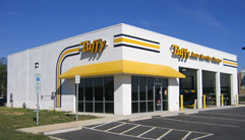When automakers first came out with cruise control, it was a real luxury item. The older cruise controls used a mechanical vacuum system but it worked. Well, some of the time.
Now days, cruise control is all electronic, thanks to computers. It's reliable and a real convenience on long trips. Cruise control is offered on most vehicles and standard on a lot of them. Because it's electronic, when it breaks, it's usually some electronic component. Your vehicle's cruise can be the victim of a blown fuse. Or your vehicle's speed sensor, which—not surprisingly—measures your vehicle's speed, can also stop working. And that will cause your cruise to stop cruising.
Vehicles with cruise control also have a built-in feature that, when the brakes are applied, turns off the cruise. With electronic cruise control, that happens thanks to the brake pedal switch, and if a problem develops in that switch, the cruise might not work.
The newest cruise control is called "adaptive." What that means is that it will maintain your vehicle's speed as well as the distance between you and the vehicle ahead of you. That means if a car ahead of you slows down, your vehicle will slow down to the same speed and even stop if the car ahead stops. Pretty cool, right? As you can imagine, adaptive cruise control is more sophisticated and has many more components than standard cruise. The systems vary from manufacturer to manufacturer, but they use on-board radar units and cameras to calculate what your vehicle should do to maintain a safe distance and speed.
Finally, there are still some of the older style cruise controls out on the roads. They'll stop working when the vacuum actuator develops a problem, a vacuum hose starts leaking or breaks or the cable between the actuator and the throttle kinks, breaks, seizes up or becomes detached.
If your cruise control isn't working, your service repair facility will be able to determine what kind your vehicle has and what it will take to fix it. Good news for the cruise blues.
Tuffy Charlotte Metro
9909 Charlotte Highway
Fort Mill, SC 29715
803-802-2466
 Sign up texting for FREE Tire Rotation
Learn more
Sign up texting for FREE Tire Rotation
Learn more
 Sign up and start Saving.
Learn more
Sign up and start Saving.
Learn more
 Sign up texting for FREE Tire Rotation
Learn more
Sign up texting for FREE Tire Rotation
Learn more
 Sign up and start Saving.
Learn more
Sign up and start Saving.
Learn more











